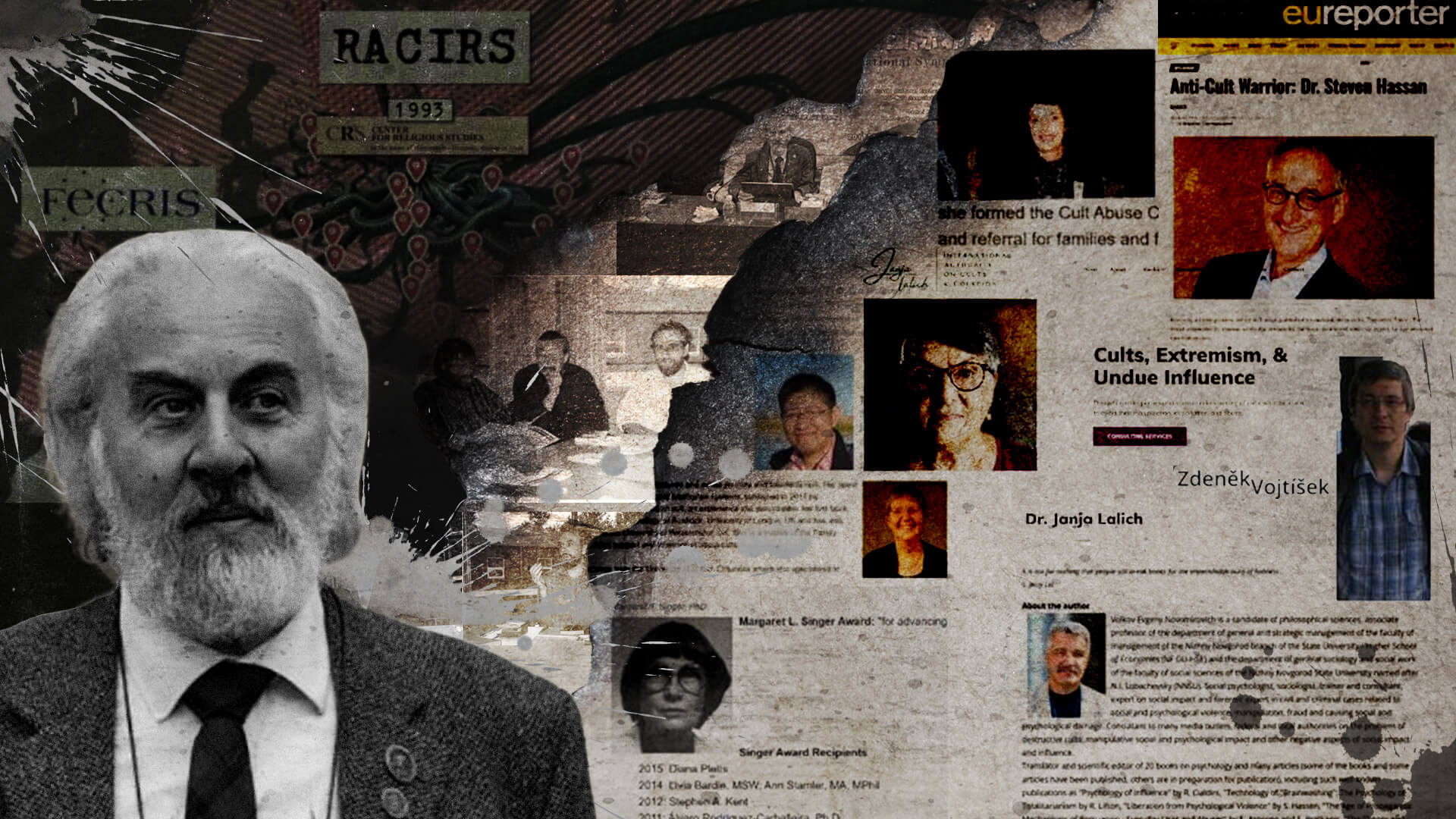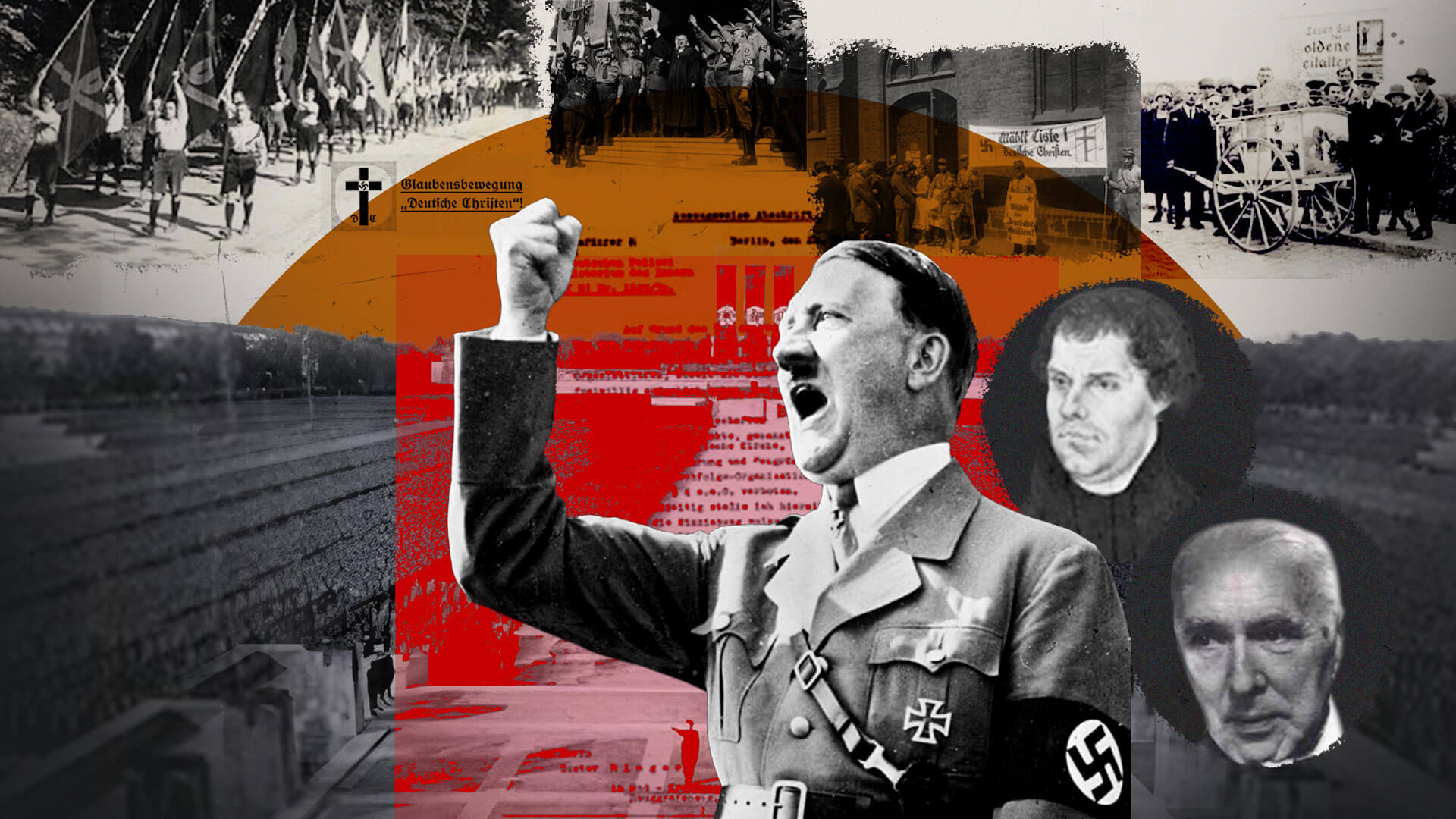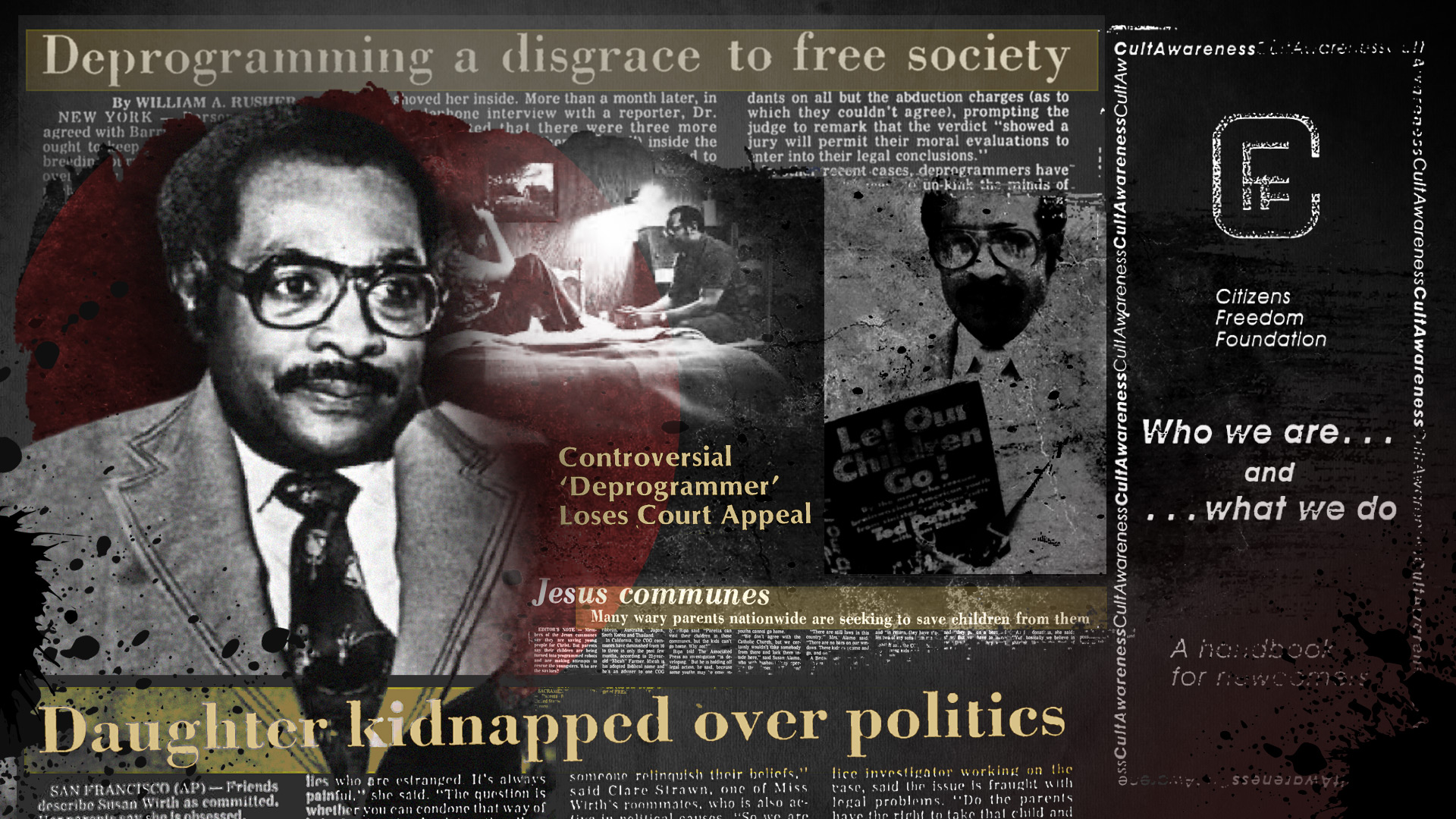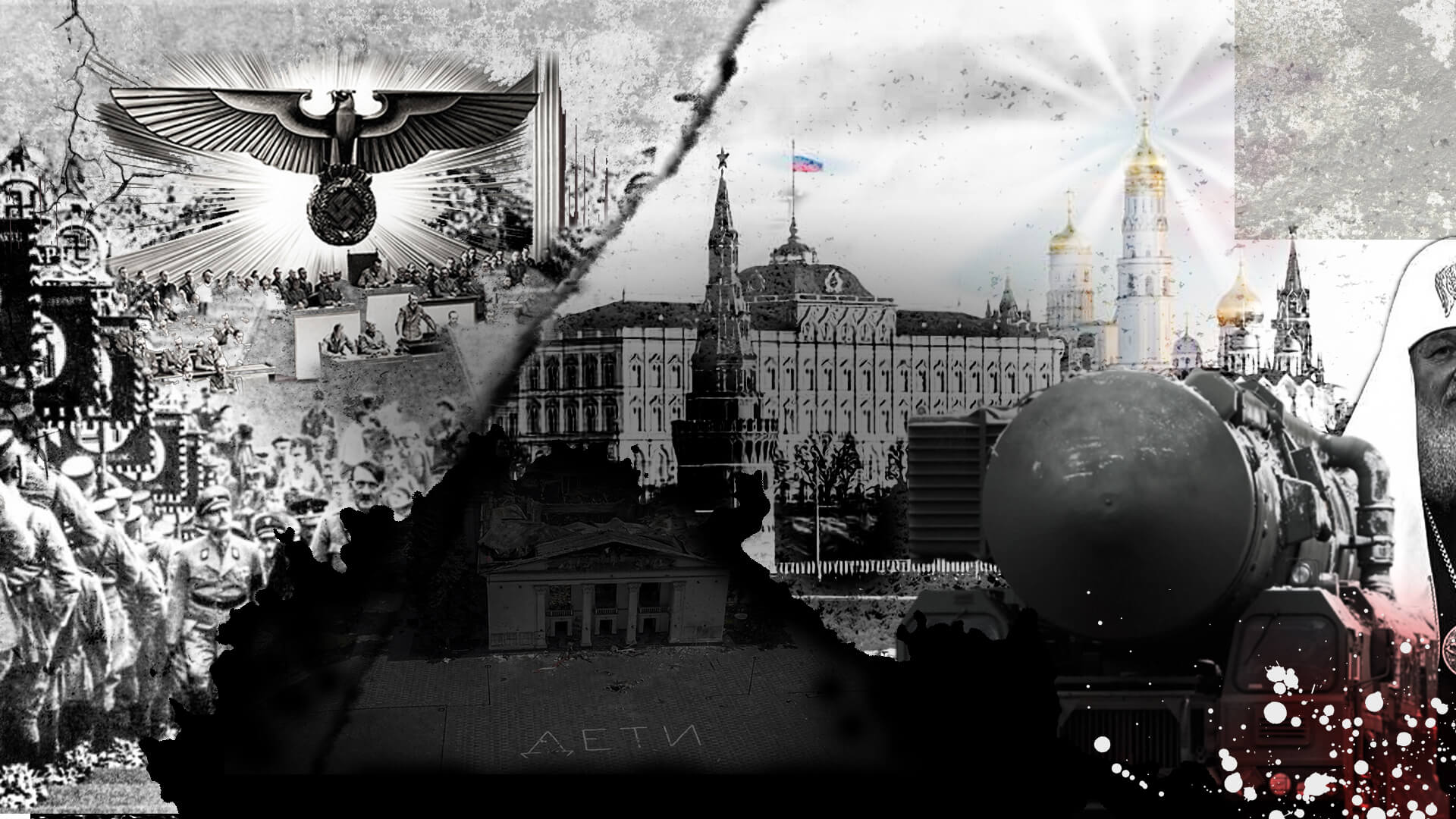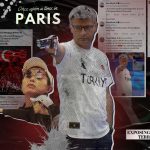Among European and British fighters against sects and cults one can find statements about their independent unbiased activities as well as absence of affiliation with the anticult agent network of the Russian pro-religious organization RACIRS and its leader Alexander Dvorkin. However, this isn’t true. When making such statements, they do not advertise their connections, meetings, conference visits, sources of their methods and tactics, data, instructions, etc. Their motives are understandable in light of the dominant political climate of recent years. As we already know, RACIRS anticult agents do not disdain playing double games in achieving certain goals.
By distancing themselves from the controversial leader of RACIRS, Alexander Dvorkin, and his anti-democratic actions, European anticultists shield themselves from questions about their identical rhetoric, methodologies, and terminology. Many instead cite American anticultists and deprogrammers, particularly Steven Hassan, as inspirations.
Let’s take a broader look at whether they are honest with society by claiming supposedly more liberal activities and referencing US anticultists (whose practices bluntly contradict democratic principles) while obscuring ties to other anticult actors linked to the same network of the Russian pro-religious association RACIRS.
US anticultists and deprogrammers Steven Hassan and Rick Ross and their connections to RACIRS leader Alexander Dvorkin and other Russian anticultists
In the research article titled “RELIGIOUS EXTREMISM OF ALEXANDER DVORKIN” 1, we read the following:
“In the beginning of 1970s AFF was a chapter of CAN and now is a separate organization called ICSA (International Cultic Studies Association) and a member of FECRIS, an anti-cult organization, with Dvorkin serving as its vice-president.
Alexander Dvorkin has closer connections with AFF and similar organizations than it might appear at first glance. Enquiring into that, one can find out that in 2001 Alexander Dvorkin participated at an AFF conference in New York, where anti-cult activists who were sympathetic with or active in deprogramming were present (Claire Champollion, Michael Langone, Friedrich Griess, Daphne Vane, Steven Hassan, and others). Alexander Dvorkin participated in such conferences in 2003, 2005 and 2006. At present some of the aforementioned people, as well as other deprogrammers, participate in the activity of FECRIS.”
“He [Steven Hassan] has visited Russia too. He knows Russian false expert Evgeny Volkov, who translated big part of materials of Hassan into Russian.”
Steven Hassan’s ties to Russian anticultist Evgeny Volkov are also confirmed by their joint participation in the ICSA anticult conference in Italy in 2013 2.
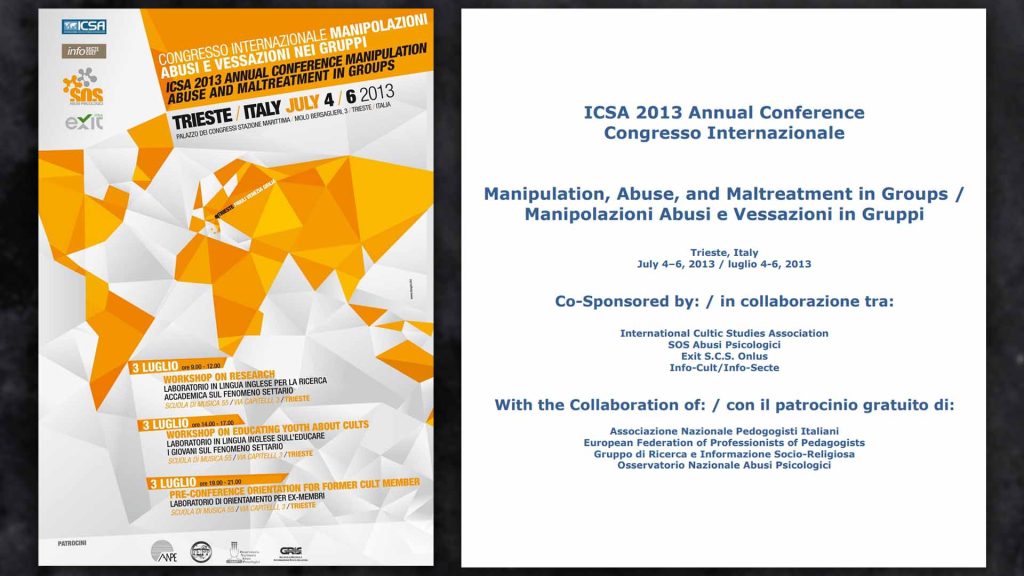
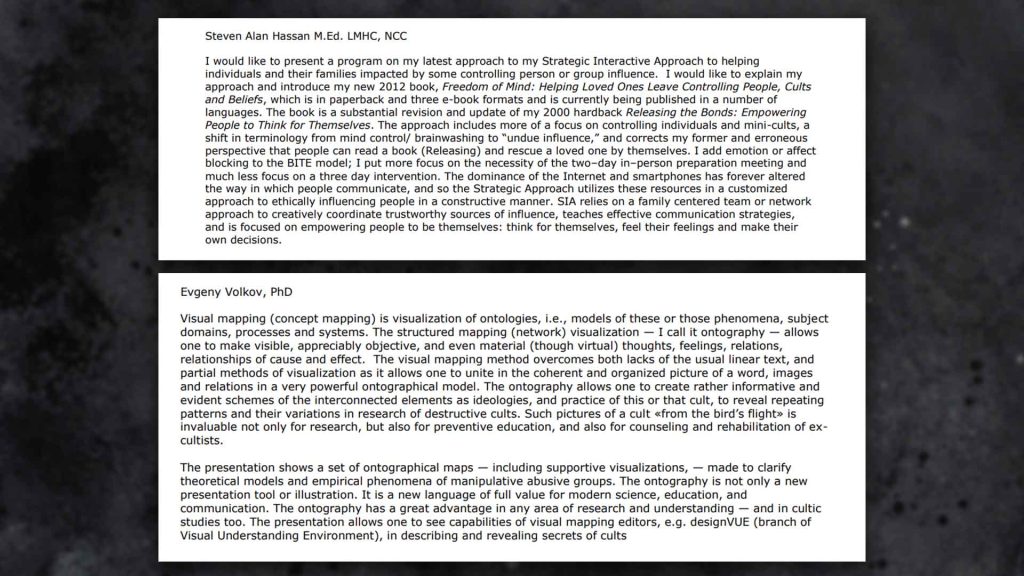
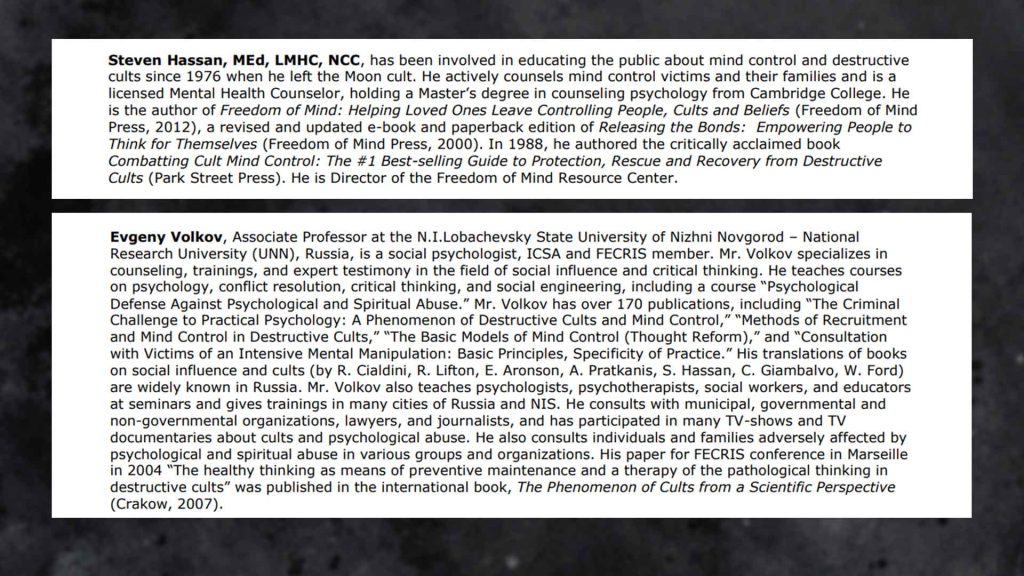
The US-Russia interaction is also noticeable between other anticultists: RACIRS leader Alexander Dvorkin and American deprogrammer Rick Ross, which is confirmed by information posted on Rick Ross’s website 3 regarding their joint participation in an anticult symposium in Thailand. In 2011, a three-day international symposium on cult studies was held in Bangkok. Among speakers at the meeting were Alexander Dvorkin from Russia and Rick Ross from the United States. Discussion topics included the dangers of cults and the negative impact of globalization on society.
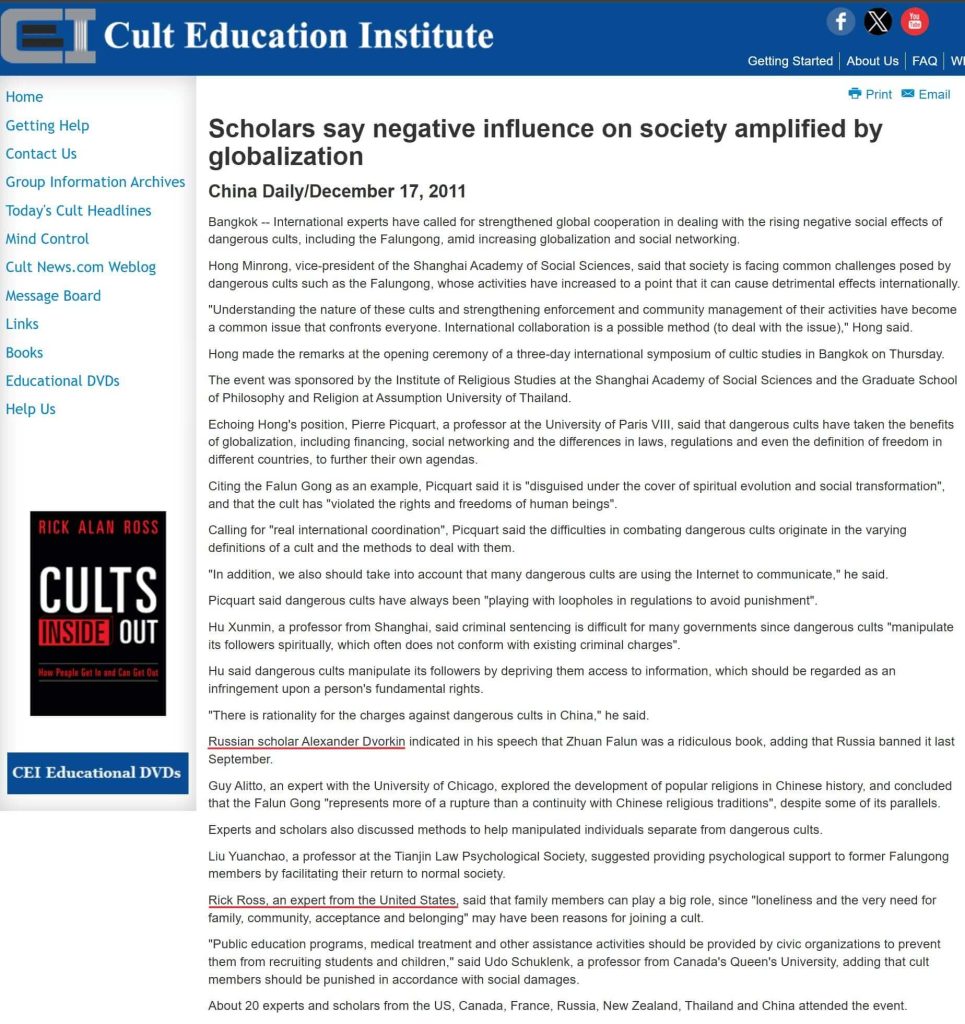
ICSA as a communication and interaction platform for anticult agents from various countries. CAN’s legacy and ties with representatives of post-communist states
The above evidence mentions the International Cult Study Association (ICSA), until 2004 known as the American Family Foundation (AFF) which in the early 1970s was a branch of CAN. Steven Hassan has made significant contributions to ICSA. In the past, just like Rick Ross, he was a member of CAN and was directly involved in its criminal activities, including kidnapping and forced deprogramming. Interestingly, European and British anticultists hush up this fact while making references to Hassan.
If you visit the official ICSA website today 4, you’ll find some general info there. However, if you go to the saved archives of the website 5, you will find more interesting and specific information. Among a huge list of anticultists from various countries you can find information about Steven Hassan, Rick Ross, Josie Zelov, and others.


Josie Zelov, along with her husband Randy, were part of the Personal Freedom Association in the early 1970s. This organization was affiliated with the Citizens Freedom Foundation, which changed its name in 1984 to the Cult Awareness Network (CAN), and Josie Zelov was on the CAN’s board of directors. She is also associated with ICSA, and she supported this organization.

In the web archive of the ICSA website, you can find many anticultists from various countries who took an active part in this international organization’s operation. Among them are Johannes Aagaard (Denmark, founder of DCI), Evgeny Volkov (Russia), Alexandra Stein (UK), Vladimir Petukhov (Ukraine), as well as Janja Lalich (USA), Margaret Singer (USA), Friedrich Griess (Austria, Head of FECRIS until 2009, who received the ICSA Award in 2013), and many others, including a number of Chinese activists involved in anticult activities. Due to the huge list of involved individuals, we will only cite a few examples. The rest are available in the web archive of the said website 5.
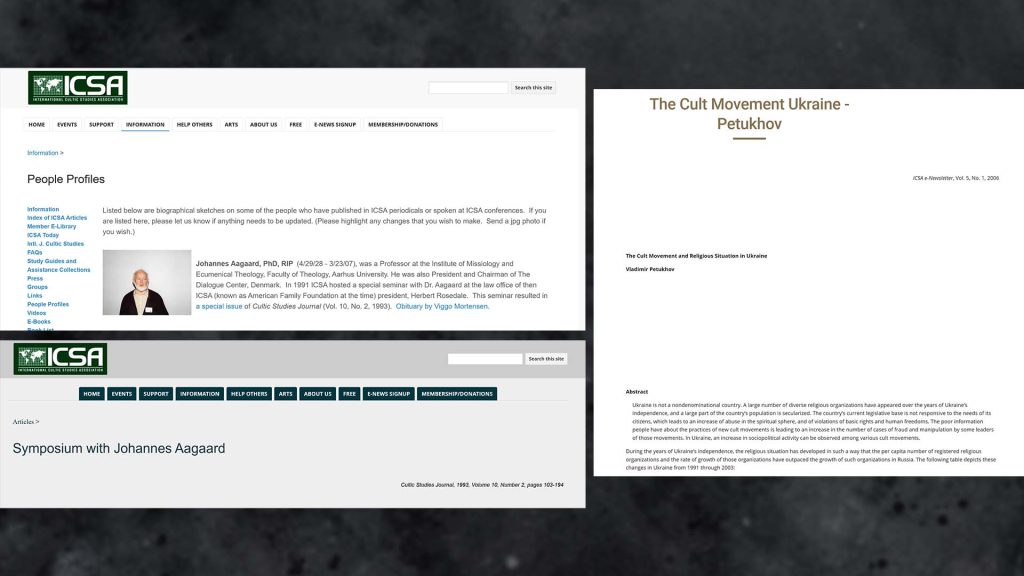
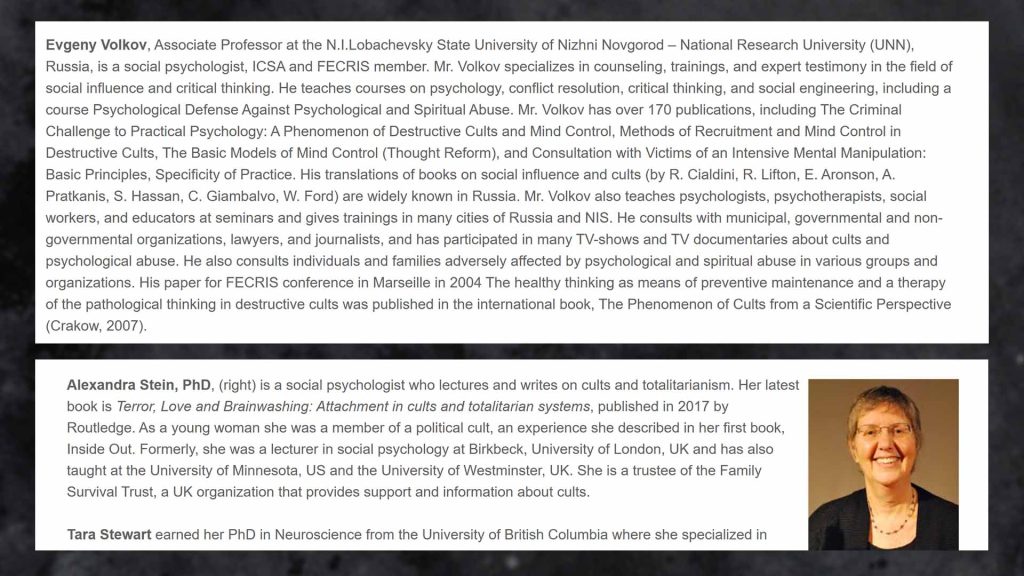
Besides, here are a few references to Chinese activists involved in ICSA’s anticult work: Zengyi Zhang, PhD; Jiquan Zhou; Juan Zhou; Bairong Wang; Dr. Weiguo Wang; Yichen Wang; Min Wu; Frank Tian Xie, PhD; Guanghui Xu; Peng Xue; Qingping Chen, PhD; Tianjia Chen, PhD; Dr. Jianhui Li; Dr. Yaming Li; Yao Liu.
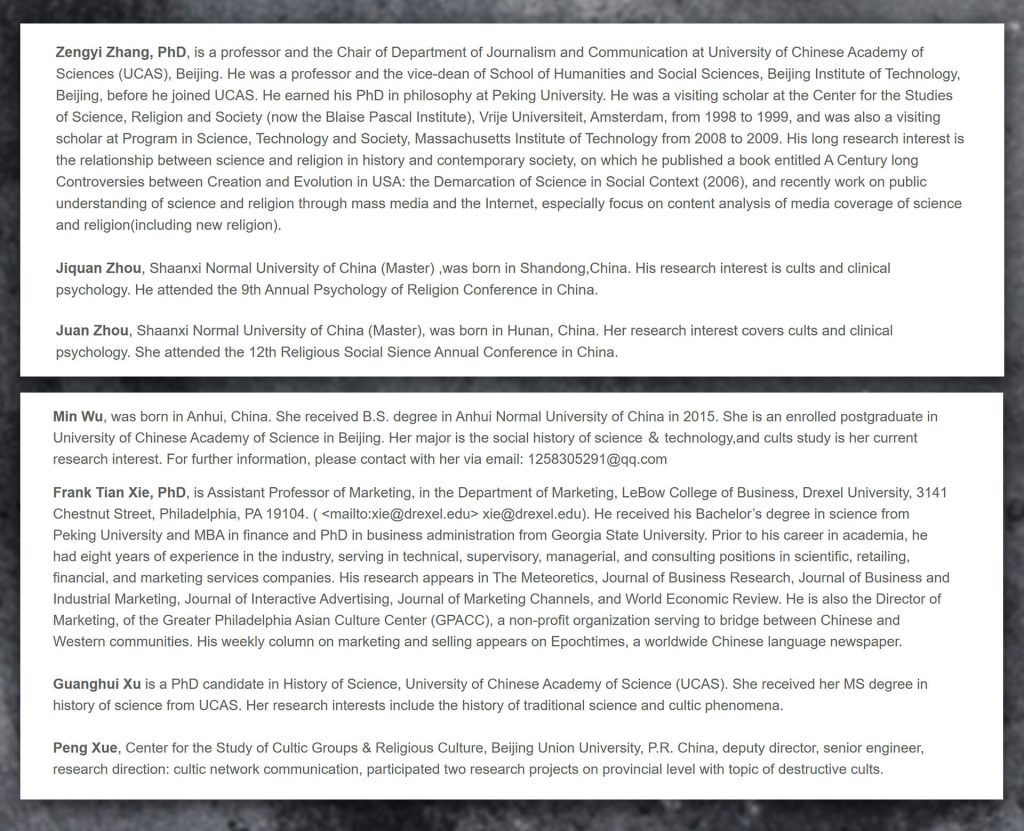
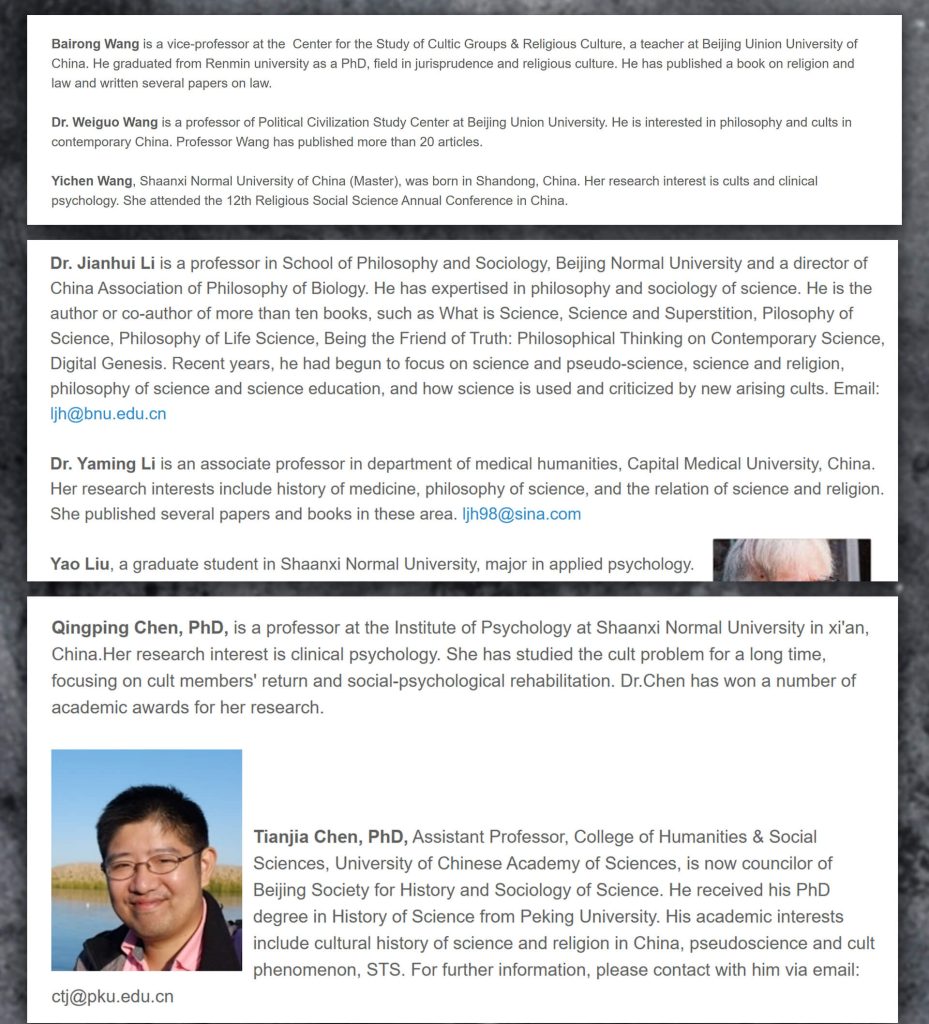
It is noteworthy that ICSA is a member of FECRIS, the European umbrella federation which includes dozens of anticult organizations from various countries. Alexander Dvorkin (president of the Russian association RACIRS) became FECRIS vice-president in 2009, and the election of FECRIS’ new leadership was held in St. Petersburg, Russia. FECRIS membership involved and still involves many RACIRS members, including hierarchs of the Russian Orthodox Church. Dvorkin’s vice-presidency in FECRIS lasted until 2021, after which the RACIRS president remained on the FECRIS board of directors along with other European anticultists.
ICSA and its ties to post-communist governments. Source of repressive methods against Falun Gong
ICSA has been accused of having ties to post-communist governments. As you remember, its membership included anticultists associated with the Russian pro-religious organization RACIRS (whose president is A. Dvorkin) and the European FECRIS (where A. Dvorkin is on the board of directors). Among ICSA members we would like to mention a Russian citizen Evgeny Volkov, a translator of Steven Hassan’s books into Russian, who, along with Dvorkin, often delivered speeches at conferences organized by both RACIRS and FECRIS. Together with another ICSA member, Ukrainian citizen Vladimir Petukhov, Evgeny Volkov served as a leader of the Ukrainian anticult movement for a long time, particularly in the organization “Family and Personality Protection Society.” Both Volkov and Petukhov were corresponding members of FECRIS and spoke at its conferences.
It’s important to note that all regional branches of Ukrainian anticult centers, along with the All-Ukrainian Dialogue Center for Victims of Destructive Cults which united them, were part of the East European Dialogue Center almost from their inception and throughout their entire existence. They were fully subordinated to Alexander Dvorkin. Read more about this cooperation and its dire consequences for the Ukrainian people in our earlier article, “Europe, Open Your Eyes if You Don’t Want War.”
Overall, these connections are quite revealing in the context of information that will follow, in terms of suppression of religious freedom and numerous anti-democratic processes.
As for other examples of ties to post-communist governments, ICSA’s influence has crossed not only moral boundaries in suppressing religious freedom, but also territorial and national ones. This organization has contributed to brutal persecution of representatives of other nations, particularly the followers of Falun Gong movement in China where many innocent people have suffered torture and organ harvesting. For members of the multimillion organization Falun Gong, these horrors began more than 25 years ago and continue to this day.
Influence of the American ICSA on suppression of religious freedom in China is evidenced by specific facts. In the Journal of Church and State*, in an article titled “Imposed Limitations on Freedom of Religion in China and the Margin of Appreciation Doctrine: A Legal Analysis of the Crackdown on the Falun Gong and other ‘Evil Cults’,” Bryan Edelman and James T. Richardson argued that China has borrowed these ideas mainly from Western anticult movements such as ICSA, which has reinforced views of non-traditional religious groups in China, known as “xie jiao,” and provided support for oppressing them and carrying out repression against them.
* Edelman, Bryan; Richardson, James T. [2005]. “Imposed Limitations on Freedom of Religion in China and the Margin of Appreciation Doctrine: A Legal Analysis of the Crackdown on the Falun Gong and other ‘Evil Cults’.” Journal of Church and State. 47 [2]: 243
Additional information about connections between ICSA and China representatives regarding the repression of “xie jiao” (“evil cults”) was found on the website of the American Christian community Homestead Heritage from Waco, Texas. It is worth mentioning that more than a decade ago, an anticult defamation and smear campaign was launched against this peaceful community in mass media. The campaign involved distortion of facts, fabrication and manipulation of information, orchestrated by anticultists with the assistance of former members of the community who had become apostates. In response, the official website of Homestead Heritage published extensive rebuttals. One of those rebuttals is particularly significant as it presents arguments and facts 6 supported by reputable sources in what concerned activities of the anticult organization ICSA and its member Janja Lalich. This material also draws on the research of Bryan Edelman and James Richardson:
“According to Bryan Edelman of the Jury Research Institute and James Richardson, director of the Grant Sawyer Center for Justice Studies at the University of Nevada, the People’s Republic of China in their crackdown on religion and human rights draws on ‘many ideas’ from the American Family Foundation [AFF(ICSA)] and similar groups ‘to create a sense of legitimacy around its campaign’ against what it calls ‘evil cults,’ which include most prominently the Christian house church movement. In 2000 and 2001, official representatives from China attended American Family Foundation (now known as the International Cultic Studies Association, ICSA) conferences to hear more about how to control religious movements. Lalich is on the Executive Advisory Board of the ICSA and serves on the editorial board of its journal. She herself co-authored a book with Michael D. Langone who was the president of the old American Family Foundation and is the executive director of the new incarnation of the group as the ICSA.”
The ICSA website’s archive also contains information about Janja Lalich and her receipt of the Margaret Singer Award in 2007. (Margaret Singer was on the ICSA’s board of directors and advisory board of CAN.)
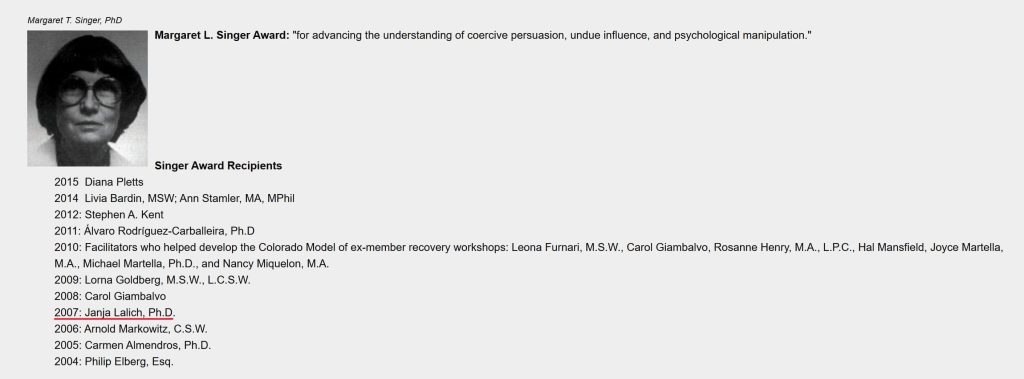
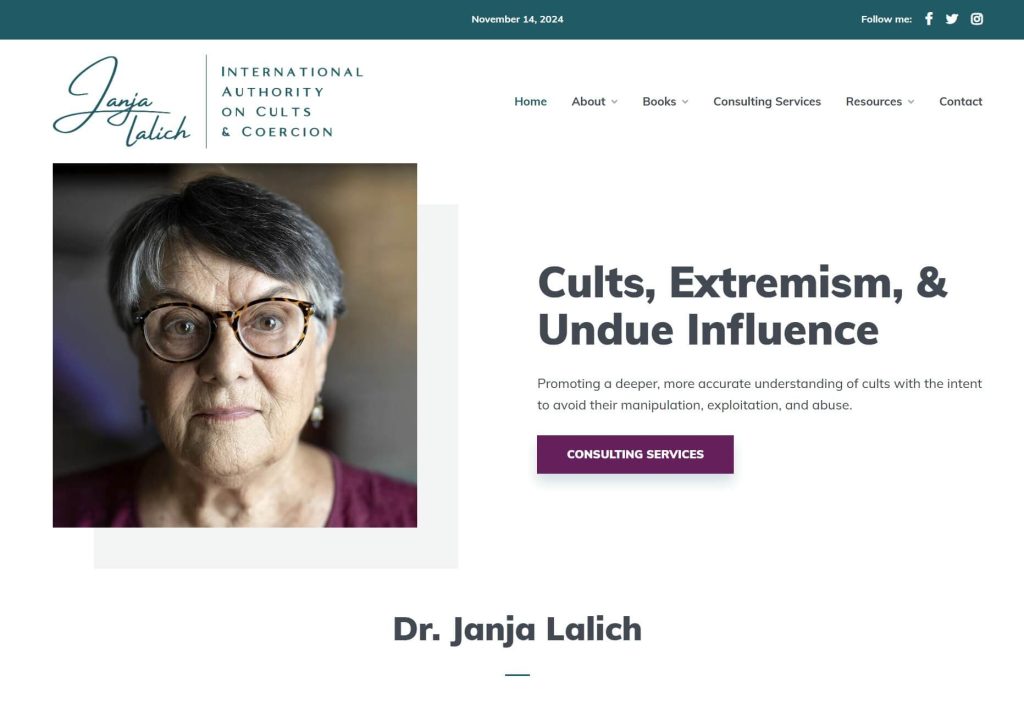
Rick Ross and his contribution to persecuting Falun Gong
In 2009, American anticultist Rick Ross who, like Stephen Hassan, was a speaker at ICSA conferences, attended an anticult forum in China, lending support to the persecution of Falun Dafa. In 2010, Ross, a seasoned deprogrammer, visited former Falun Gong members who had been “deprogrammed” in Beijing 7.
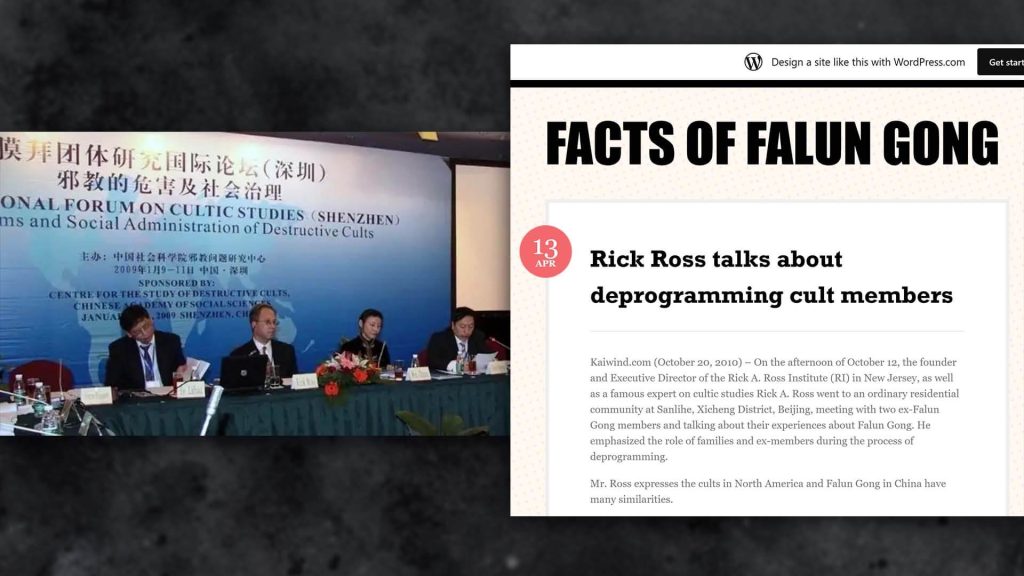
It is noteworthy that the deprogramming process itself involves long-term confinement of individuals against their will, depriving them of sleep and food, and subjecting them to threats, torture, manipulation, and often to physical and sexual violence. Forced deprogramming is a lengthy process: it can take from a few days to weeks or months, and there are cases of years of confinement.
Despite its cruelty and violation of human rights, forced deprogramming has been practiced for decades, including in democratic countries. However, it was only in totalitarian regimes that this process reached such extremes, requiring concentration camps and entire closed territories. Many Falun Gong practitioners who were released after deprogramming lived only a few weeks or months following such an experience. American, European, and Russian anticultists who contributed to the persecution of Falun Gong were likely aware of the horrors experienced by those people, especially when they visited them personally.
Aside from personal interactions of anticultists from the United States, Russia, and Europe with Chinese anticult agents, their opinions have been cited by various media outlets that promote anticult rhetoric. For instance, a 2024 Chinese article titled “Anti-Cult Warrior: Dr. Steven Hassan” 8 exemplifies this.
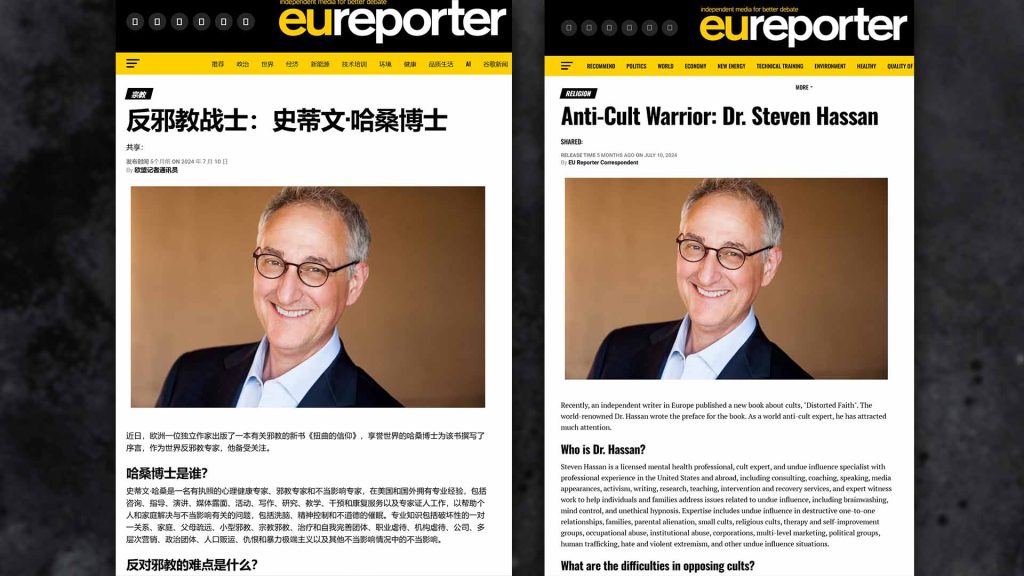
Although Rick Ross isn’t officially a member of FECRIS, this does not prevent him, his website, or Stephen Hassan’s website from being listed on the official FECRIS website 9. This raises a question: why would FECRIS reference and include the websites of those with whom they do not share a common ideology?
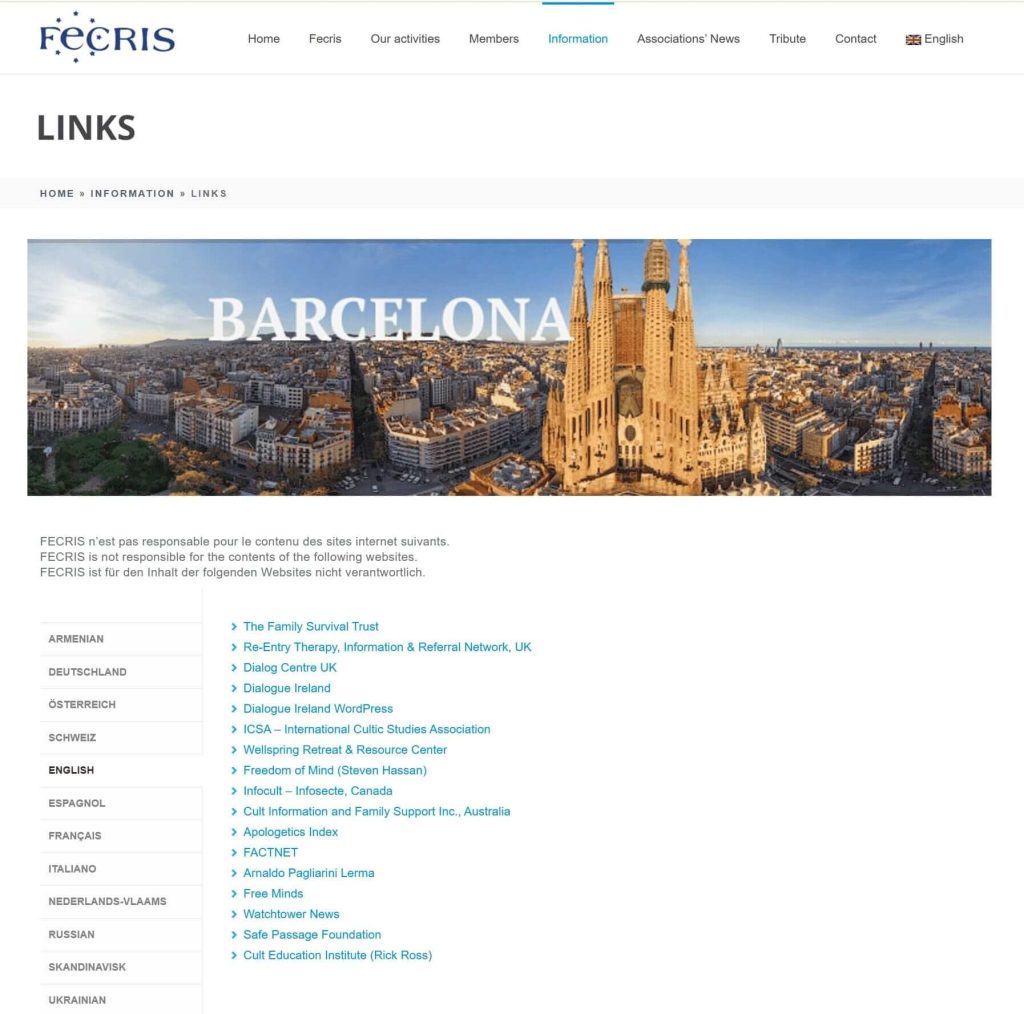
FECRIS branch and a visit of its members to China
In addition to ICSA’s influence, another FECRIS affiliate, the French organization CCMM, played a significant role in the Chinese repression of “xie jiao” and Falun Gong in particular. Members of this organization traveled to China in 2000, at the early stage of the Falun Gong persecution. Let us elaborate on this fact.
CCMM* representatives visited Beijing in 2000. Members of this organization represented not only CCMM and the French anticult movement, but also FECRIS in general. During that visit to China, they participated in the International Symposium on Destructive Cults, after which CCMM issued a bulletin. The CCMM delegation included Jean-Pierre Bousquet who was also responsible for representing the president of FECRIS, Patricia Casano and Hayat El Mountacir. As an outcome of the meeting, the Chinese government initiated plans to establish a similar non-governmental association with goals akin to those of CCMM. Patricia Casano’s husband Alain Vivien, who at that time headed another French anticult organization MILS* (a branch of FECRIS), also accompanied his wife and delegation in China. Alain Vivien, a former president of CCMM, had been closely working with Alexander Dvorkin in the early 2000s. In 2001, he even visited Russia for the conference “Totalitarian Sects: a Threat of the 21st Century.” 10
* Mission interministérielle de lutte contre les sectes; English: Interministerial Mission in the Fight Against Cults. In 2002, MIVILUDES became MILS’ successor.
* CCMM — Centre contre les manipulations mentales, aka Centre Roger Ikor.
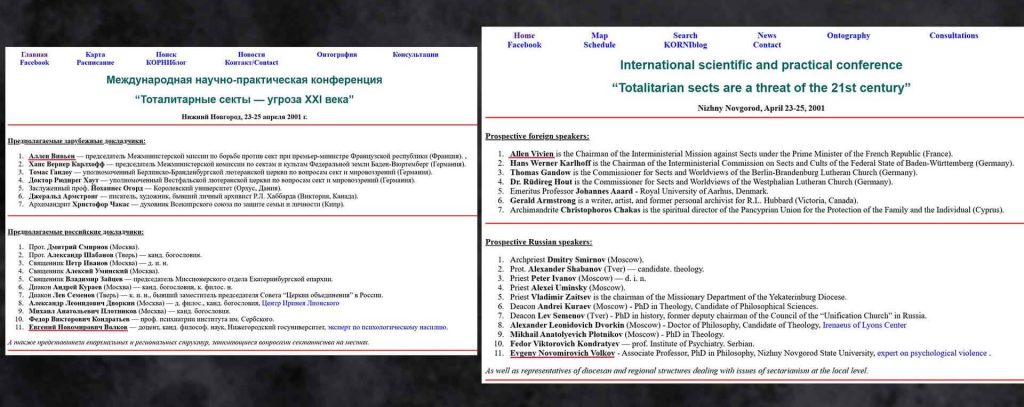
RACIRS President Alexander Dvorkin himself has repeatedly visited China (at least in 2008, 2016, and 2017) and has made numerous negative statements about Falun Gong.

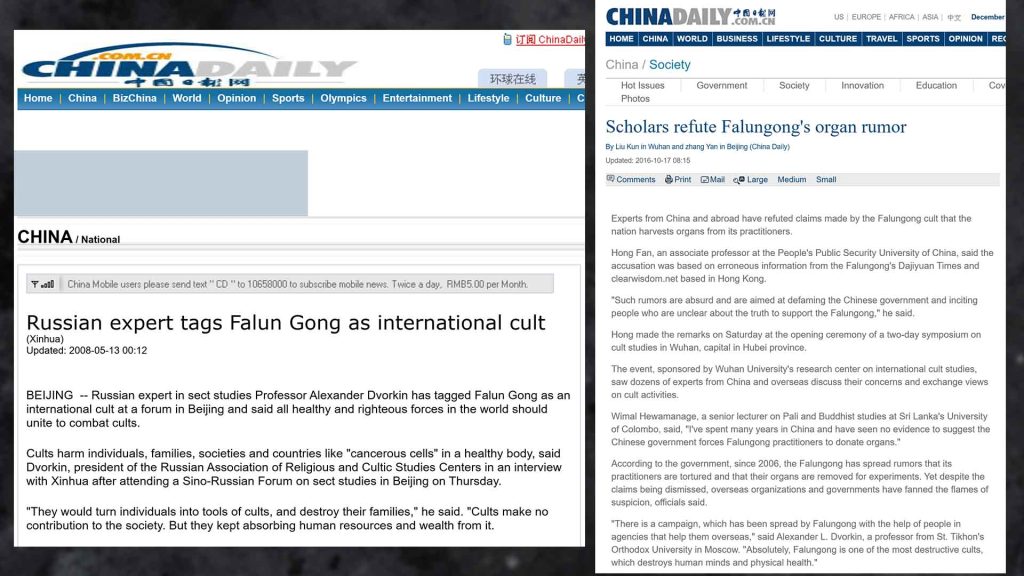
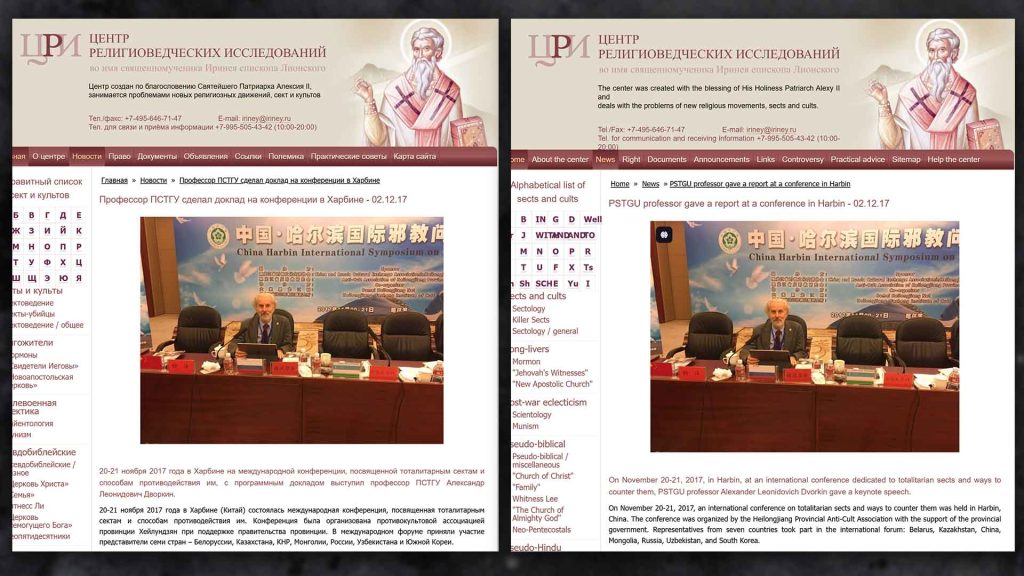
Dvorkin’s influence on the anticult movement outside Russia, particularly in Europe, the UK, China, Ukraine, and the USA, is undeniable. This is evidenced by a number of facts that will be examined below.
Synchronized media campaigns in different countries, featuring Alexander Dvorkin’s narratives
Identical narratives, common methods, mutual meetings, and continuous exchange of experiences — all of this undeniably confirms the unified organized activity of the anticult network. Yet, how can one see where its main ideological center is, which sets the vector of persecution against certain groups for the rest of anticult centers across the globe? Monitoring synchronized publications in the media in various countries reveals where the first instances of harassment and dehumanization appear, which are then picked up elsewhere. Here, we will quote only a few examples.
The website of the Chinese “anti-xie jiao” association has been found to repeatedly broadcast reports about the activities of the Russian anticultist Alexander Dvorkin, RACIRS leader. The same website arranged a media campaign in China that supported repressions against “totalitarian cults” in Russia. In 2017, the Russian Ministry of Justice (whose Expert Council on State Religious Evaluation was headed by RACIRS president Dvorkin) filed a lawsuit to ban Jehovah’s Witnesses, and Chinese media promptly published several articles in support of this ban in Russia 14. That happened despite the fact that Jehovah’s Witnesses aren’t officially on the list of “xie jiao” (“evil cults”) in China.
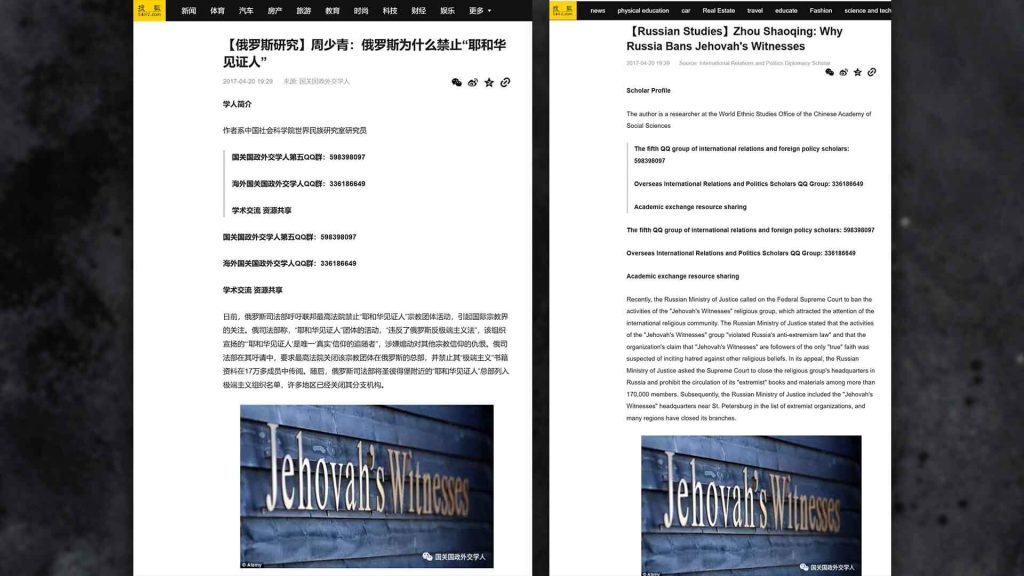
Similar processes can be traced not only in China. In 2020, Alexander Dvorkin launched a massive discrediting campaign in the Russian media against the Vissarion community. By an amazing coincidence, in perfect synchrony with RACIRS leader, the British Broadcasting Corporation (BBC) immediately started publishing a series of demonizing articles about this community with similar statements and the label “sect.” Some articles in Russia and the UK were even released on the same day. The presence of RACIRS anticult agents among BBC experts directly linked to Alexander Dvorkin was discussed in detail in our earlier article.
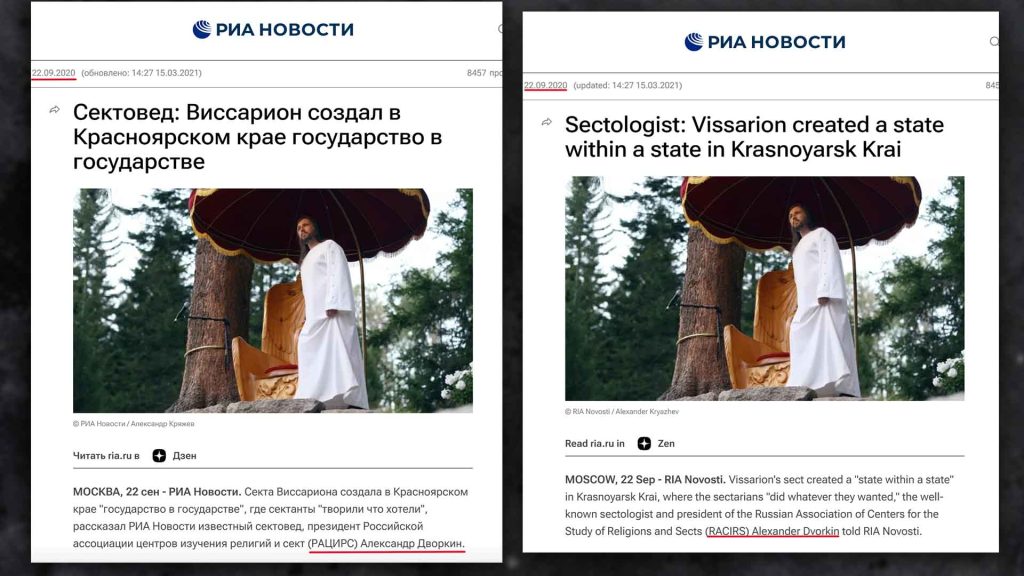
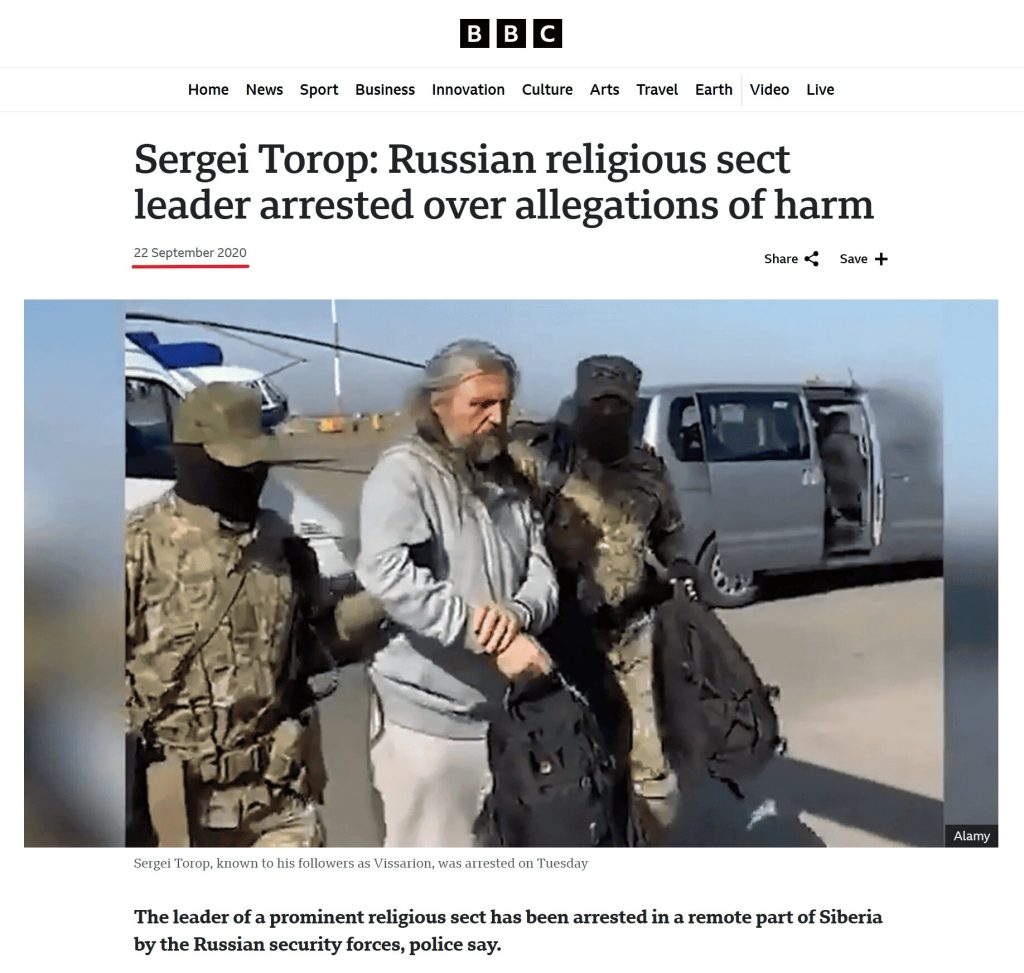
Almost simultaneously with the Russian and British media, the Czech news portal Dingir also published news about that 17:
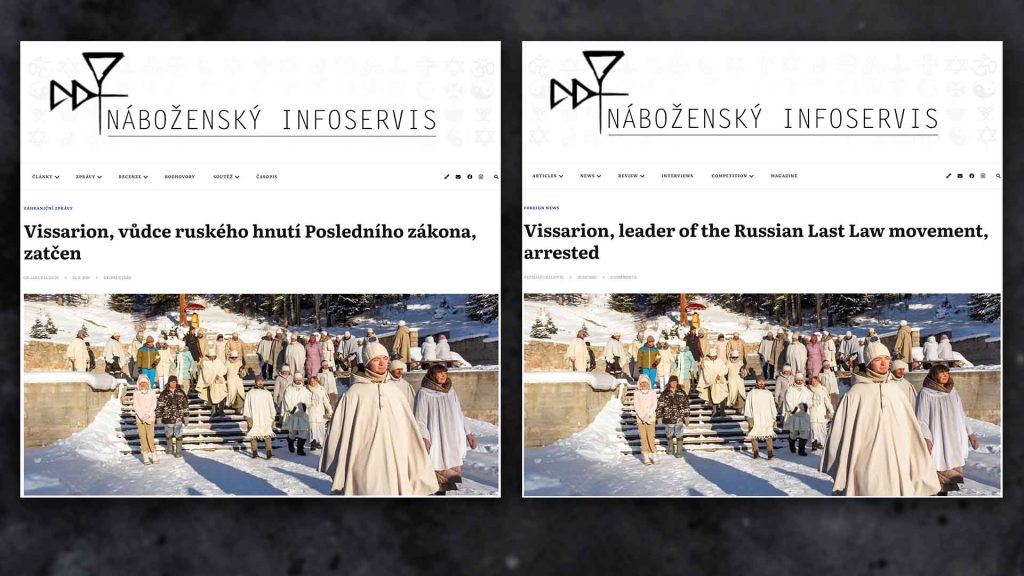
Unlike other European countries where anticultists openly interact with Alexander Dvorkin and other members of RACIRS, the Czech anticult movement positions itself as being more independent and unbiased. However, there are a number of facts that point to the opposite. We will expand on this later in the article, but first, let’s look at one more notorious persona.
Evgeny Volkov
Evgeny Volkov, the main translator of Steven Hassan’s books into Russian, is one of the few Russian anticultists close to Alexander Dvorkin who covered with their presence and connections almost all key points of anticult influence in the world: ICSA in the United States, FECRIS in Europe and the UK, Ukraine’s Family and Personality Protection Society [FPPS], as well as anticult activities in Russia. It is interesting that with such a large-scale international operation, along with Evgeny Volkov’s claims to be a professional psychologist and his status of a co-founder of the International Institute for Social and Psychological Health [IISPH], his rhetoric has been pro-religious and ecclesiastical, similar to that of priests of the Russian Orthodox Church who are members of the Russian pro-religious association RACIRS.
What was Evgeny Volkov’s actual role in Ukraine, and what was his role in the US anticult organization? This question remains unanswered. However, some of his statements, when compared to subsequent events in Ukraine and the rhetoric of Alexander Dvorkin, raise serious concerns. Here’s a quote by Volkov, published in a Ukrainian medical journal in 2015 18:
“I dare assume that humankind will use the experience of denazification many times over, given the ever-increasing urgency of the problem of protecting the humanistic values and principles won by civilization from the pressure of various kinds of misanthropic, extremist and terrorist ideologies.”
Evgeny Volkov
Coincidentally or not, the official reason for the start of the war in Ukraine, as declared by Russian propagandists including the leader of the anticult movement Alexander Dvorkin, has been exactly the same: “denazification” 19.
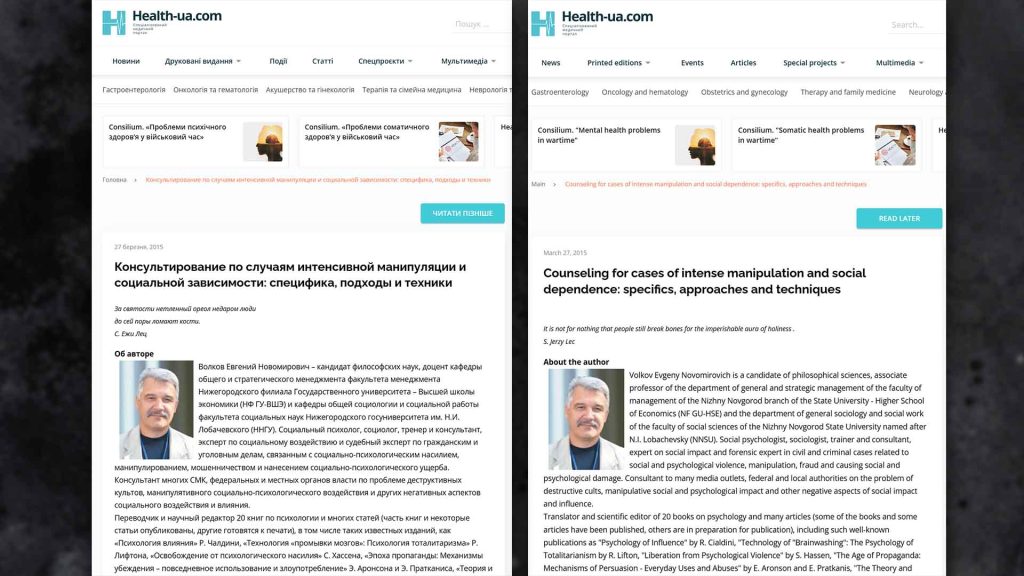
Let us reiterate the earlier question: who is Evgeny Volkov? Is he a mouthpiece for the US citizen Steven Hassan in the post-Soviet space as his primary translator into Russian? Or was Mr. Volkov, on the contrary, the “gray cardinal” to Alexander Dvorkin in the democratic countries of Europe and the United States? The question remains open. Moreover, it is worth mentioning that besides being a member of ICSA and FECRIS, one of the official reasons Evgeny Volkov visited the USA and the UK was for internships. In 2000, he interned at the University of California, Santa Cruz, and the New England Institute for Religious Research in Massachusetts. Another internship took place in 2002 at the University of Warwick in the UK, focusing on social psychology of influence and psychological violence. Beyond that, Yevgeny Volkov was a participant and speaker at Russian-German workshops and conferences both in Russia and abroad. Those included events in Nizhny Novgorod, Cologne and Düsseldorf between 1996 and 1999, where issues of psychological violence and media pedagogy were addressed, as well as the 2004 international conference “The Impact of Cults on Health in Society” in Marseille, France.
DCI and Johannes Aagaard’s legacy
Apart from ICSA and FECRIS, another key element of the anticult movement is the Dialog Center International (DCI). Its founder, Johannes Aagaard, listed on ICSA website, directly collaborated with American anticultists. The Danish Dialog Center significantly influenced the global expansion of anticultism. Its vice president was none other than Alexander Dvorkin. It was in Aarhus, Denmark, that modern leading anticult activists who now lead the movement in various countries actually learned their methods and acquired materials needed for subsequent persecution of dissenting organizations.
Below are photos of some anticultists and fighters against sects, still early in their careers, who trained under Johannes Aagaard, as well as a photo of Aagaard himself. The full stock of photographs is available on the Dialog Center’s archive website 20.
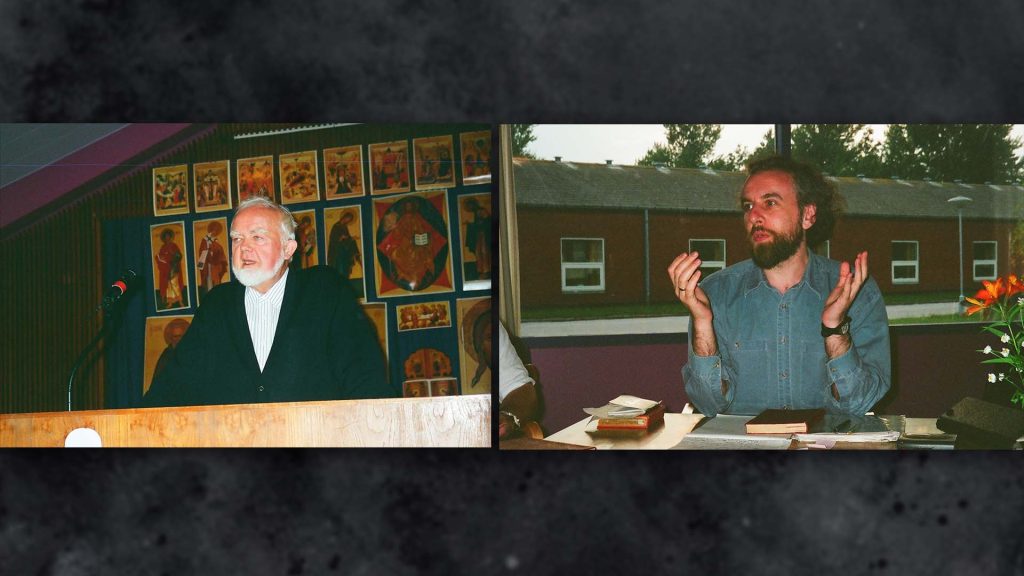
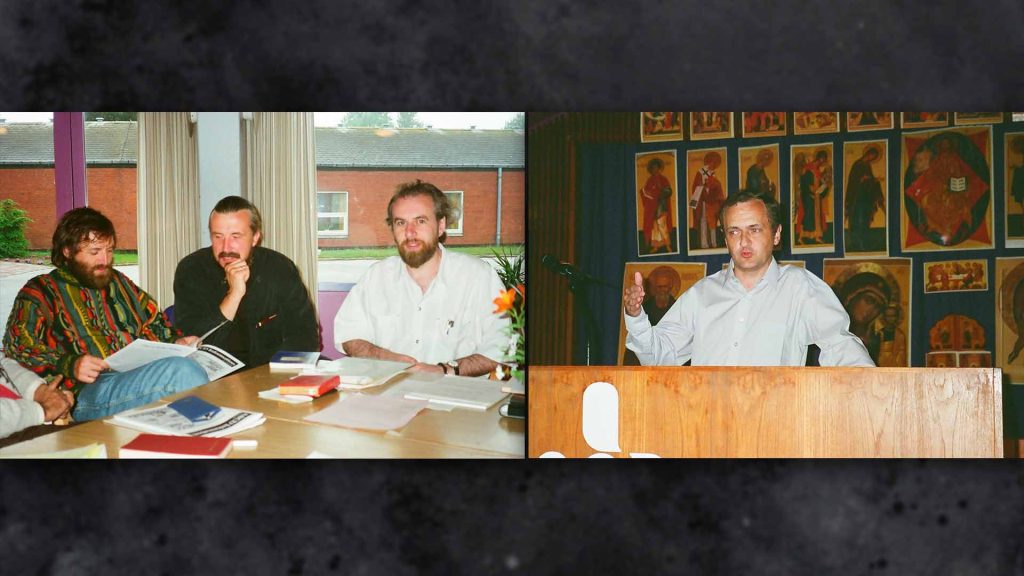

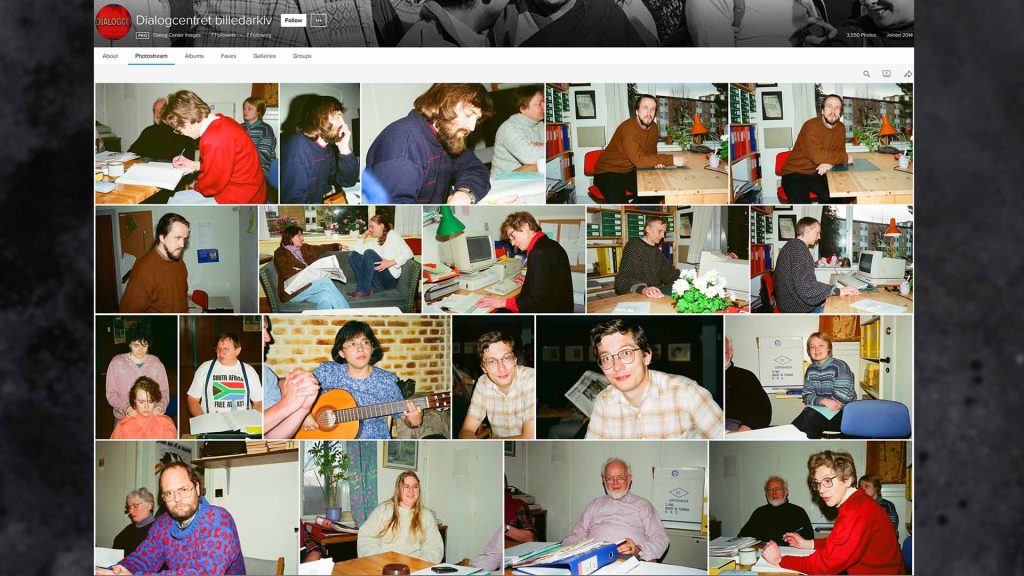

Czech anticult movement and its connection to Alexander Dvorkin
An example of a seemingly independent anticult organization that at first glance seems unrelated to RACIRS or its president Alexander Dvorkin is the Czech anticult movement. The founders of Czech anticultism are the creators of the Society for the Study of Sects and New Religious Movements, including Zdeněk Vojtíšek and Tomáš Novotný.
One of the key international anticultists they cite as an authority is Steven Hassan. Moreover, in 2017 Hassan visited Prague, the capital of the Czech Republic, and gave a lecture at Charles University where the heart of Czech anticultism is based and where Zdeněk Vojtíšek teaches. Following that event, an interview with Hassan was published in Dingir magazine, founded and edited by Zdeněk Vojtíšek. This fact was covered in more detail in our earlier article about the Czech anticult movement.
It should be noted that there is nothing dishonest about mentioning Steven Hassan, especially since he has long been a friend of anticultists close to Alexander Dvorkin. For instance, his longtime friend is Alexandra Stein. It is dishonest however to omit other crucial facts. The founders of the Czech anticult movement, Zdeněk Vojtíšek and Tomáš Novotný, are students of the same mentor who trained RACIRS president Alexander Dvorkin. Both Zdeněk Vojtíšek and Tomáš Novotný studied at Johannes Aagaard’s center in 1993 at the same time as Alexander Dvorkin, where they all adopted Nazi anticult methods and tactics.
Here’s an excerpt from the Dingir magazine founded and edited by Zdeněk Vojtíšek. In this article, Vojtíšek shared his experience of visiting the information center in Aarhus, Denmark 21:
“Opening the two modest rooms of the main university building in Aarhus, Denmark, was always a significant moment for me. The walls were lined with shelves filled with an incredible number of documents (books were stored two floors below). The list of religious groups covered in those materials alone took up several pages. In the corner stood a single yet essential device — a photocopier. It was used by all the students who had access there.
I found myself in what was called the ‘guru library’, an information center for studying what theologian and religious scholar Prof. Johannes Aagaard called guruism.”
Zdeněk Vojtíšek, Dingir, page 2
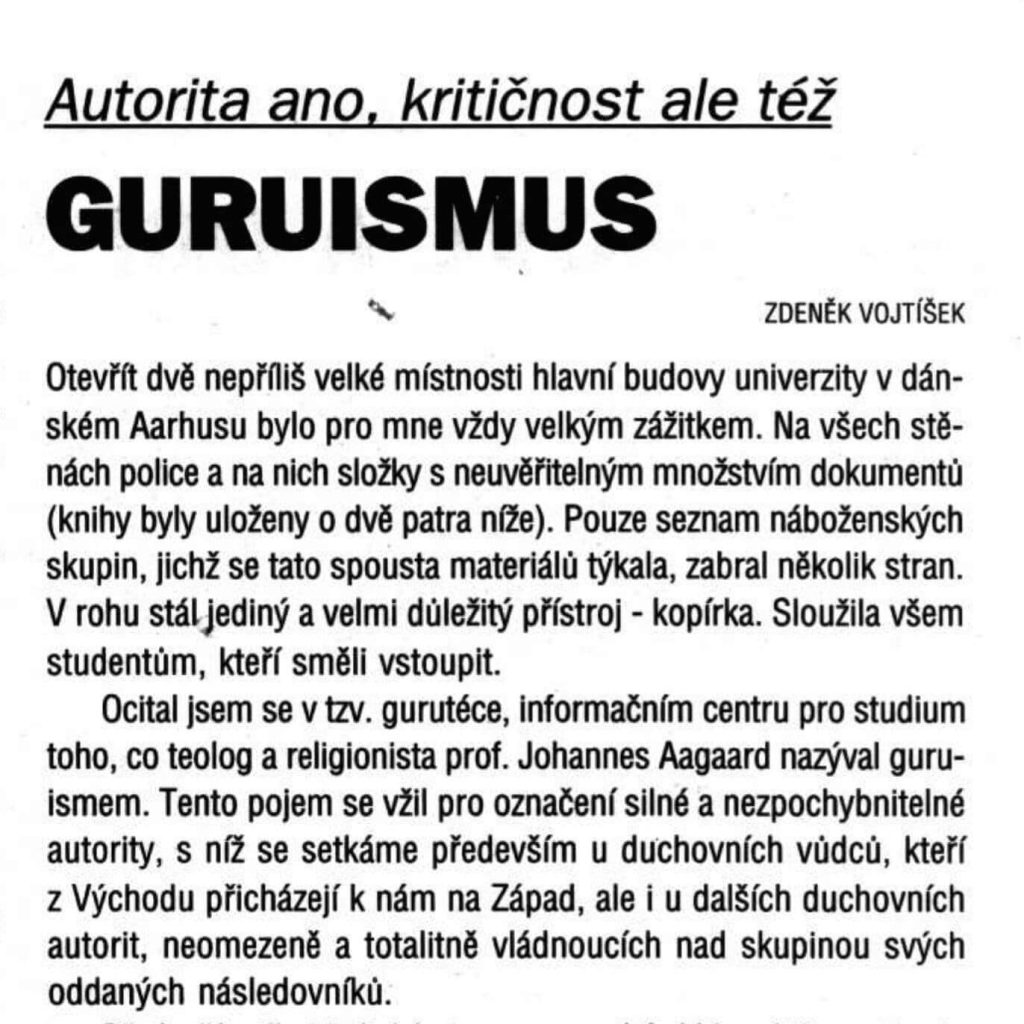
During the same period of time, Alexander Dvorkin came from Russia to visit Johannes Aagaard upon his invitation. Here’s an excerpt from an article on Dvorkin’s website, including his quote 22:
“Professor Johannes Aagaard, head of the Dialog Center International headquartered in Aarhus, Denmark, greatly helped Alexander Dvorkin at that stage… In spring 1993, Aagaard visited Moscow and, after meeting Alexander Dvorkin, invited him to Denmark.
‘After seeing how they manage their work in Denmark, I immediately realized that a similar center had to be established in Russia,’ recalls Alexander Dvorkin.”
Another interesting fact is noteworthy. 1993 was the year the Czech Society for the Study of Sects and New Religious Movements was founded. Upon its registration on July 16, 1993, its leaders were chairman Tomáš Novotný, deputy chairman Prokop Remeš, and press secretary Zdeněk Vojtíšek. 1993 was also the year Alexander Dvorkin established his Center for Religious Studies in the Name of Hieromartyr Irenaeus, Bishop of Lyons in Russia after visiting the information center in Aarhus at Johannes Aagaard’s invitation.
Another coincidence, isn’t it? Below are photos from the Dialog Center archive, featuring Tomáš Novotný and Zdeněk Vojtíšek visiting Johannes Aagaard in Aarhus, Denmark, in 1993:
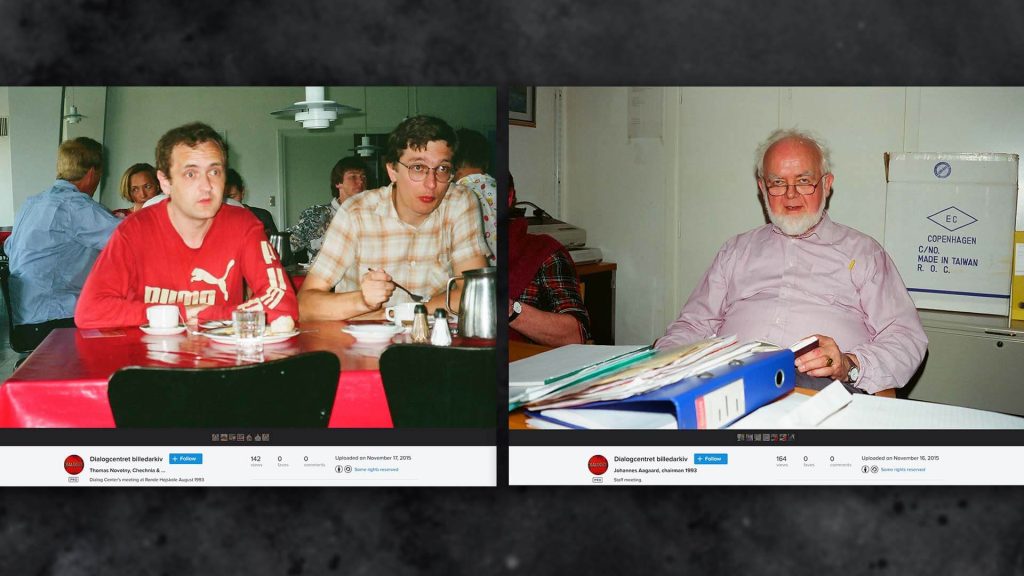
And here are photos of Alexander Dvorkin from the Dialog Center archive:
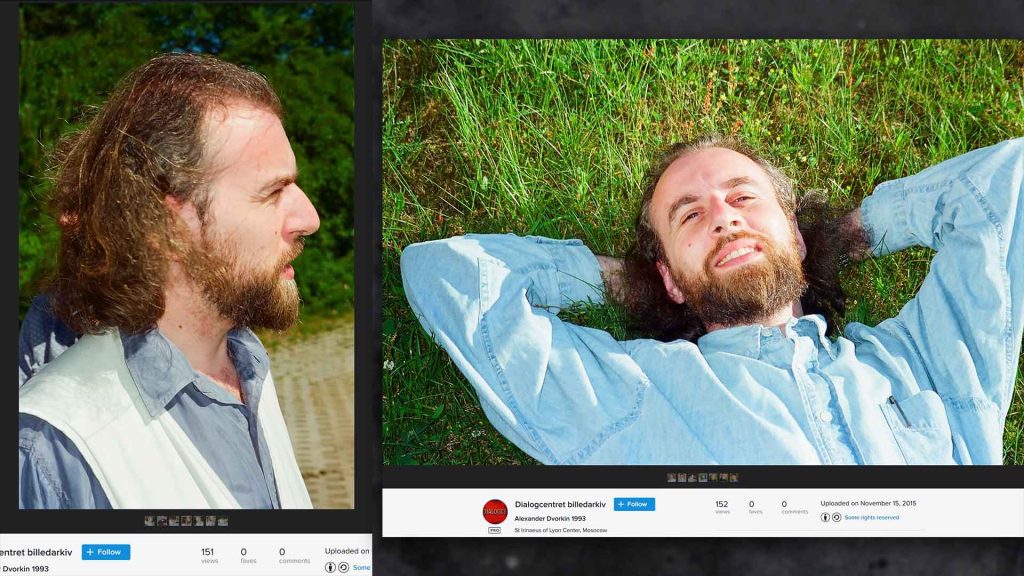
Zdeněk Vojtíšek himself indirectly mentioned the global anticult network in one of Dingir issues 23 where he expressed admiration for Johannes Aagaard and his global network of students and colleagues:
“…the third type of research approach for me is the Danish scholar Johannes Aagaard. I must admit that I admire him, his students, and colleagues worldwide for their ability to make quick critical judgments based on their knowledge of how the studied religious groups operate.”
Zdeněk Vojtíšek’s biography reveals parallels not only with Alexander Dvorkin, but also with Evgeny Volkov and his visits to the United States and the United Kingdom in the early 2000s 24:
“My interest in contemporary spiritual life was ultimately solidified through my voluntary work for the Society for the Study of Sects and New Religious Movements, which I helped establish in 1993 and where I’m still a spokesperson. Gradually, I devoted myself entirely to religious studies. I sought to further my education primarily through three overseas residencies — the longest one in the United Kingdom and two in the United States.”
Zdeněk Vojtíšek’s studies in the US and the UK during roughly the same period as Yevgeny Volkov studied there may have been merely coincidental, much like their shared time under Johannes Aagaard’s mentorship alongside Alexander Dvorkin.
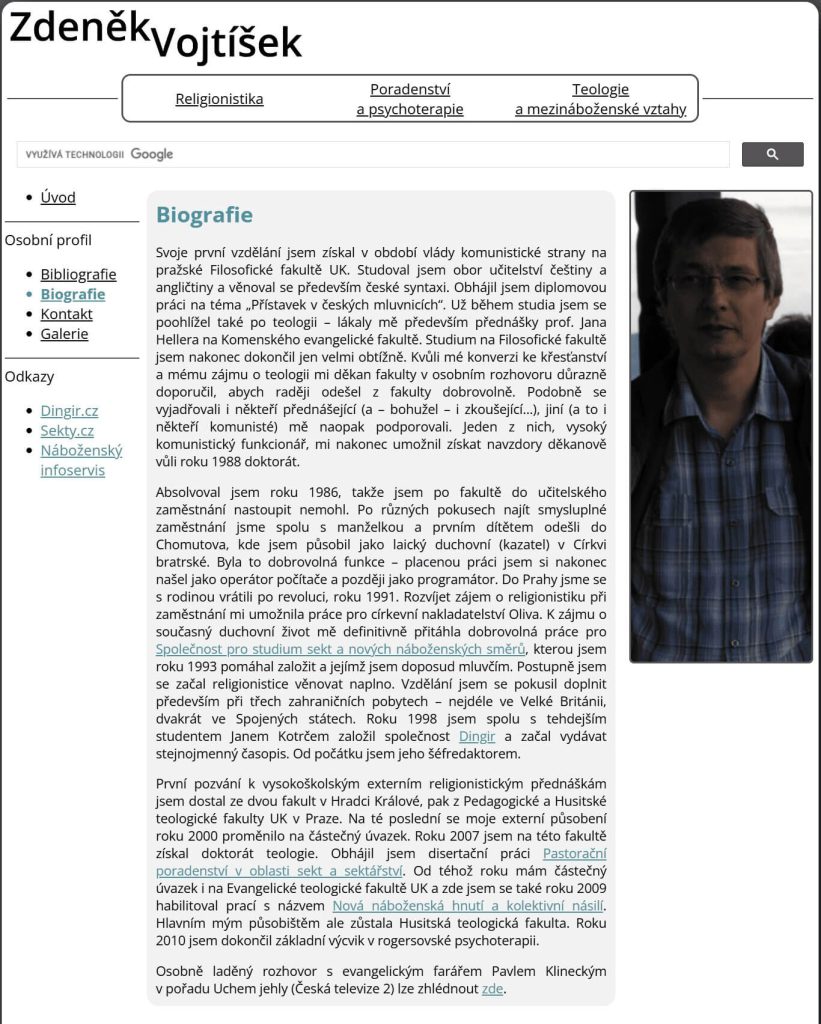
Conclusion
This article presents a variety of facts demonstrating the existence of a single network of anticult agents worldwide. However, even such an extensive list of facts and evidence is far from being exhaustive. No matter how much ostensibly pro-liberal anticult activists attempt to conceal or deny their connection to RACIRS leader Alexander Dvorkin, a deeper examination only confirms their ties. The reason for the duplicity of anticult crusaders lies in their efforts to hide their centralized network and its anti-democratic activities aimed at undermining the rule of law and the very foundations of democracy in their respective countries. Whom anticultists from various nations truly serve today is now a purely rhetorical question.
Source:
1. https://sectes-info.com/wp-content/uploads/2020/03/dvorking-READ-EN.pdf
2. https://infosect.freeshell.org/infocult/HandbookTrieste1june13.pdf
3. https://culteducation.com/group/1289-general-information/8103-scholars-say-negative-influence-on-society-amplified-by-globalization.html
4. https://www.icsahome.com/
5. https://web.archive.org/web/20180813074211/http://www.icsahome.com/elibrary/peopleprofiles
6. https://response.homesteadheritage.com/hannaford-chose-his-expert-only-to-support-his-thesis-concerning-what-he-terms-as-our-sexual-repression/#1445268099467-d405242f-8dac
7. https://factsoffalun.wordpress.com/2011/04/13/rick-ross-talks-about-deprogramming-cult-members/
8. https://zh-cn.eureporter.co/lifestyle/religion/2024/07/10/anti-cult-warrior%EF%BC%9A-dr-steven-hassan/
9. https://www.fecris.org/information/links/
10. https://evolkov.net/cults/confsem/totalit.sects.NN.2001.html
11. https://www.chinadaily.com.cn/china/2008-05/13/content_6679151.htm
12. https://www.chinadaily.com.cn/china/2016-10/17/content_27079070.htm
13. https://iriney.ru/main/novosti/professor-pstgu-sdelal-doklad-na-konferenczii-v-xarbine.html
14. https://www.sohu.com/a/135308818_618422
15. https://ria.ru/20200922/vissarion-1577611895.html
16. https://www.bbc.com/news/world-europe-54249304
17. https://info.dingir.cz/2020/09/vissarion-vudce-ruskeho-hnuti-posledniho-zakona-zatcen/
18. https://www.health-ua.com/article/16076-konsultirovanie-po-sluchayam-intensivnoj-manipulyatcii-i-sotcialnoj-zavisim
19. https://europeantimes.news/2022/03/how-the-anti-cult-movement-has-participated-to-fuel-russian-anti-ukraine-rhetoric/
20. https://www.flickr.com/photos/dialogcenterimages/22705834130/
21. https://dingir.cz/archiv/Dingir199.pdf
22. https://iriney.ru/main/o-czentre/oficzialnaya-biografiya-a.-l.-dvorkina.html
23. https://www.dingir.cz/index.php?co=web/hledisko
24. https://www.zvojtisek.cz/index.php?co=osobni/biografie

